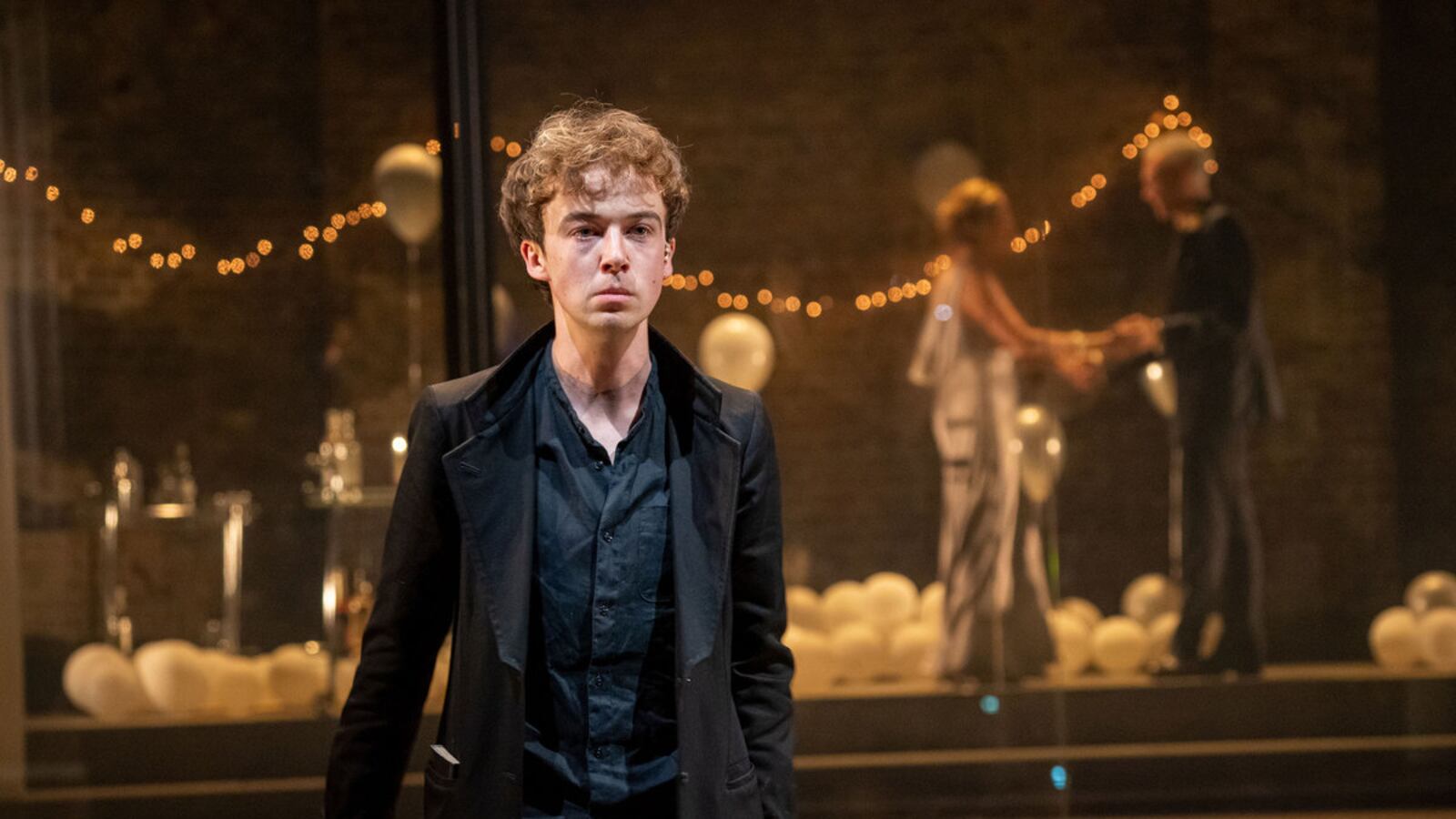There are many artistic and moral questions to be discussed around the 3-hour, 50-minute Hamlet that has just opened in the cavernous expanse of New York City’s Park Avenue Armory (running through Aug 13). But to answer some important basic questions first: Yes, your ass and legs should be fine. The seats are super-comfortable and legroom more plentiful than in most Broadway houses; the views of the stage are clear and unobstructed thanks to the audience sitting on risers.
The theater staged in the Armory is consistently memorable; not always successful but always striking—inventive designers and directors have fun here, as seen on productions as various as Yerma, Enemy of the People, The Damned, and the first incarnation of The Lehman Trilogy before its Tonys-triumphant Broadway run.
Does this Hamlet feel long, too long? Four hours long? No, it does not. Theatergoers know the restive yawns of fellow seatmates as plays progress past two and a half hours. Such sighs, and any restlessness, were absent the night this reporter saw Hamlet. The audience was engrossed, by what was unfolding on stage, the words spoken so beautifully, and the thoughts and questions flowing from those words.
The production, playing in repertory alongside director Robert Icke’s Oresteia (July 8 to August 13), is a demure spectacle. The stage is bare, bar some Scandi-style sectional sofas. It features large glass walls, which occasionally slide open, and a recessed area where we hear and see the tinny-sounding celebrations of parties present and heavenly, with white balloons tethered, floating wanly in the air. In a play famous for its ghosts, even the living feel spectral. The time and dress are modern, even if the text—not hugely cut, but revised as illustrated in this New Yorker article—is Shakespeare-traditional.
TV screens—a giant bank of them in the middle of the stage, two smaller ones on each side—transmit what looks like a Danish 24-hour news station (confusing as the TV graphics are the only Danish thing we see or hear) broadcasting the words of Fortinbras (Nikesh Patel), as well as the first sightings of the ghost of the king (David Rintoul) as he encourages Hamlet (Alex Lawther) to avenge his death.
Lawther looks so young, Hamlet in this production is a kind of boy-man furious and mired in the grief and anger at the loss not only of his father but also at his father’s brother Claudius (Angus Wright) for murdering him and marrying his mother Gertrude (Jennifer Ehle). This fury never evolves and never abates; of the few times the audience laughed, it is when a character wonders aloud what is bugging Hamlet so much. Well, yes. Hamlet begins in one place, stays there, descends, stays there, and seems fixedly bonkers the entire time, except when he is looking at the audience asking us All The Big Stuff. Then the bratty psycho transforms in a blink to soulful philosopher-therapist.
Wright does not play Claudius as much of a baddie, while Hamlet pretending to be mad doesn’t seem to be a stretch either because he seems fairly mad from the minute we meet him. Grief or seeing his father’s ghost are quickening engines to a rollercoaster ride to the depths of the soul he is already intent on. Ehle makes Gertrude’s desolation, and her inability to connect with and comfort her son, feel like a trap she knows all to well and yet denies for her own self-preservation, lost in the shoe-kicking passion she has for urbane silver fox Claudius.
Kirsty Rider’s Ophelia segues all too quickly from flirty sunbeam to guilt-ridden mad person; and one of Ehle’s major speeches is to describe her dead, garlanded by the kinds of flowers that Ophelia herself, moments earlier, had recited to us as instruments of her own self-harm. Royal attendant Polonius (Peter Wight, in a scene-stealing role) is both a loving, flawed father and haphazard plotter, never to be trusted to see a plan through, involving (very funnily) hidden microphones and (not-so funnily) himself as a concealed object.
Such moments point to the standout element of this production, and why the four hours pass by so fluidly: the spoken Shakespeare as performed by the whole company, and particularly Lawther as Hamlet, is gorgeous. There is delight and thought behind each word. That is why we as an audience were rapt. Hamlet’s famous speeches, “To be or not to be” and the rest, are addressed to the audience slowly and precisely, in a kind of dreamy but pointed interrogation of their meanings and implications.
Indeed, throughout the evening, the audience—by use of lighting—is itself illuminated as if to suggest that the responsibility of ultimate interpretation of the characters’ words, and the meaning of the play, are down to us, not Shakespeare or the company performing in front of us.
Characters like Rosencrantz (Bartley Booz), Guildenstern (Tia Bannon), and the Gravedigger (Ross Waiton) who proffers alas-poor-Yorick’s skull, are given their due time. The performance is broken down into three sections, with two intermissions—the first of those intermissions is not at the moment you might expect; indeed the audience is again semi-invited into the action on stage to mark it.
There is such care on stage when it comes to the text and its depth that it is a shame the TV screens significantly detract from it. The pre-pandemic Ivo van Hove-directed West Side Story marked a new nadir in the use of TV screens on stage, adding nothing to what we could see as an audience, and even more than nothing when it came to the interpretive richness and power of the text.
Here, they are used to convey ghostly goings-on via security camera (OK, we can go with that), then the words and intent of Fortinbras (who becomes a meaningless adjunct to the production because of them, along with the war we don’t really care that much about), and then—when the players arrive—as a kind of eye for us on the main characters as we watch Claudius’ furious reaction to Hamlet’s added words implicating him in his father’s death. Sure, it means we can watch the players and the reactions on the principals’ faces, but they could also just be in our sightline without any of the techno-trickery.
The screens return for Hamlet and Laertes’ (Luke Treadaway) final poison-tipped sword fight, and again it feels lazy—our eyes flick to screens too easily anyway, they are trained to. But force your eyes to watch the stage. The fight is just as compelling. The multimedia-age stage addiction to screens is understandable, and directors should feel free to be as groovy and innovative as they want. But what if cameras and screens are not adding anything new to your material; what if it’s cheap dazzle for the sake of cheap dazzle?
Many people are in front of screens all day for work, and then when work is over, on comes the TV. An excursion to the theater is an escape from screens; and so if screens are being used on stage, they should be used sparingly, or at least with a point—or it feels like a depressing busman’s holiday for everyone watching.
The screens in Hamlet detract from other, lovelier notes of direction from Icke, which again—right at the end of this languid interpretation—underscore it as a production focused on grief and the grace of farewells. What is not forgiven or forgotten is at least consigned to some kind of peace, with the legacy of war and discord hushed with those wretched screens thankfully turned off.







